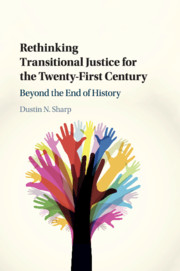Book contents
- Rethinking Transitional Justice for the Twenty-First Century
- Rethinking Transitional Justice for the Twenty-First Century
- Copyright page
- Contents
- Preface
- Acknowledgments
- 1 Introduction
- Part I Transitional Justice Peripheries
- 2 Justice for What?
- 3 Justice for Whom?
- 4 Justice to What Ends?
- Part II Building a Better Foundation
- Bibliography
- Index
2 - Justice for What?
from Part I - Transitional Justice Peripheries
Published online by Cambridge University Press: 23 February 2018
- Rethinking Transitional Justice for the Twenty-First Century
- Rethinking Transitional Justice for the Twenty-First Century
- Copyright page
- Contents
- Preface
- Acknowledgments
- 1 Introduction
- Part I Transitional Justice Peripheries
- 2 Justice for What?
- 3 Justice for Whom?
- 4 Justice to What Ends?
- Part II Building a Better Foundation
- Bibliography
- Index
Summary
- Type
- Chapter
- Information
- Rethinking Transitional Justice for the Twenty-First CenturyBeyond the End of History, pp. 19 - 38Publisher: Cambridge University PressPrint publication year: 2018



